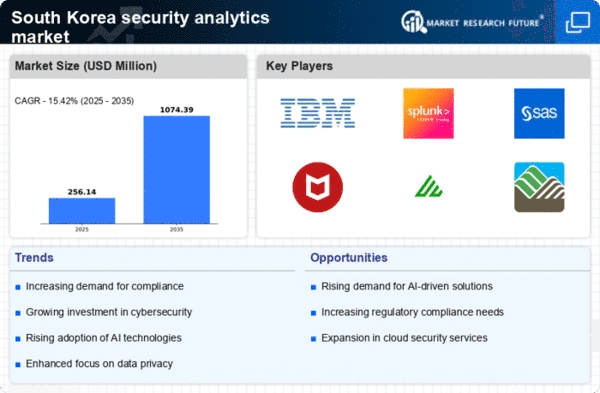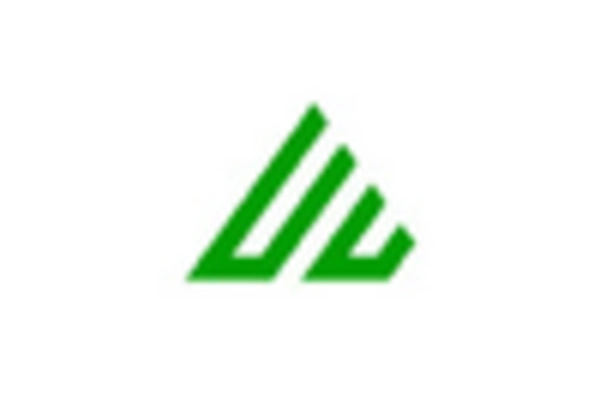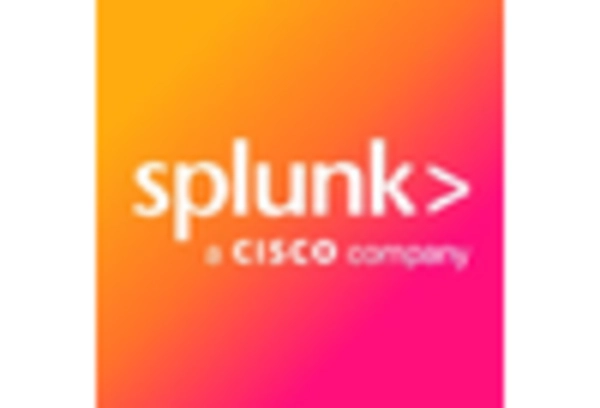Rising Cyber Threats
The increasing frequency and sophistication of cyber threats in South Korea is a primary driver for the security analytics market. As organizations face advanced persistent threats, ransomware attacks, and data breaches, the demand for robust security analytics solutions intensifies. In 2025, it is estimated that cybercrime could cost the global economy over $10 trillion annually, with South Korea being a significant target due to its advanced digital infrastructure. Consequently, businesses are investing heavily in security analytics tools to enhance their threat detection and response capabilities. This trend indicates a growing recognition of the need for proactive security measures, thereby propelling the security analytics market forward.
Increased Data Generation
The exponential growth of data generated by businesses in South Korea is a significant driver for the security analytics market. With the rise of IoT devices, cloud computing, and big data analytics, organizations are collecting vast amounts of sensitive information. In 2025, it is estimated that data generation in South Korea will reach 2.5 zettabytes, necessitating advanced security analytics solutions to manage and protect this data effectively. Companies are increasingly recognizing that traditional security measures are insufficient to handle the complexities of modern data environments. Therefore, the demand for sophisticated security analytics tools that can analyze large datasets in real-time is expected to surge, further propelling the market.
Government Initiatives and Support
The South Korean government has been actively promoting cybersecurity initiatives, which significantly impacts the security analytics market. With the establishment of the Cybersecurity Strategy and the Cybersecurity Act, the government aims to bolster national security and protect critical infrastructure. In 2025, government spending on cybersecurity is projected to reach approximately $1.5 billion, reflecting a commitment to enhancing the nation’s cyber resilience. This support not only encourages private sector investment in security analytics solutions but also fosters collaboration between public and private entities. As a result, the security analytics market is likely to experience substantial growth driven by these governmental efforts.
Growing Awareness of Cybersecurity
There is a notable increase in awareness regarding cybersecurity risks among businesses in South Korea, which is driving the security analytics market. Organizations are beginning to understand the potential financial and reputational damage that cyber incidents can cause. As a result, many companies are prioritizing investments in security analytics solutions to mitigate these risks. Surveys indicate that over 70% of South Korean businesses plan to increase their cybersecurity budgets in 2025, reflecting a shift in mindset towards proactive security measures. This heightened awareness is likely to lead to a more competitive landscape in the security analytics market, as companies seek to differentiate themselves through enhanced security capabilities.
Technological Advancements in Security Solutions
Technological advancements in security solutions are significantly influencing the security analytics market in South Korea. Innovations such as artificial intelligence, machine learning, and advanced threat intelligence are being integrated into security analytics tools, enhancing their effectiveness. In 2025, the market for AI-driven security solutions is expected to grow by over 30%, indicating a strong trend towards automation and improved threat detection. These advancements enable organizations to respond to threats more swiftly and accurately, thereby reducing the potential impact of cyber incidents. As businesses seek to leverage these technologies, the security analytics market is poised for substantial growth, driven by the demand for cutting-edge security solutions.
















